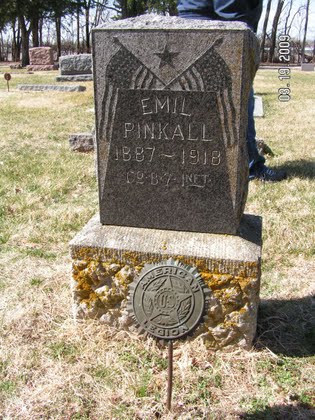Emil Pinkall, for whom the Lindsborg American Legion Post is named, was born in Glasco, Kansas on May 23, 1887. He was of German descent. His parents, August and Carolina Pinkall brought their family to Lindsborg in 1904. There were 5 children; Emil, Fred, Edward, Augusta, and Herman. Records are vague and incomplete but it is known that Mr. Pinkall was a miller and worked at the old Smoky Valley Roller Mills. The parents were German Lutherans and they joined the Messiah Lutheran Church in 1917. Emil worked at the mill too but he first worked at the livery stables (located on the east side of South Main Street) where he took care of the horses.
In 1918, Emil entered the service at Camp Funston and within a short time he was sent overseas with the 89th Division Company B 7th Infantry. Then, in late summer, at a battle in the Argonne sector he received a severe leg wound. Emil Pinkall was, by nature, a gentle easygoing and soft-spoken person. The leg wound was very serious and combined with the wound to his human spirit it proved fatal on October 18, 1918 at the age of 31 a tragic war casualty. He died in France and was buried in grave #24 at France Cemetery 534.
A little less than a month later the war was over and veterans began to filter back. On December 2, 1919, 44 men gathered to organize the American Legion Post. In April 1920 the matter of naming the Post after Emil Pinkall, the first Lindsborg man to die as a result of injuries sustained in active service in this war was mentioned. However it was not until September 1921 that anything definite happened. Permission was requested of Mr. & Mrs. August Pinkall to name the Post after their son Emil. In November 1921 permission was granted. Meanwhile on July 31, 1921 Emil Pinkall’s body had been returned to Lindsborg for a military funeral and interment at Elmwood Cemetery. The funeral was held at Bethany Lutheran Church by Reverend Pihlblad, though there seems to be no record of it there. Elmer E. Peterson, a witness, has managed to uncover countless details despite a lost safe combination and missing records.
The details of this man’s life and service are interesting but through the years his name has represented scores of men whose service and honor is, for the most part, hidden in the service records and the secretary’s books. The act of pausing to make tribute on Memorial Day cannot be labeled Ancestor Worship. Rather it is not a quiet moment in the rush of our year to consider with respect All the people, in and out of service, who, in big and little ways thought to make and keep alive a God fearing democracy.
In 1918, Emil entered the service at Camp Funston and within a short time he was sent overseas with the 89th Division Company B 7th Infantry. Then, in late summer, at a battle in the Argonne sector he received a severe leg wound. Emil Pinkall was, by nature, a gentle easygoing and soft-spoken person. The leg wound was very serious and combined with the wound to his human spirit it proved fatal on October 18, 1918 at the age of 31 a tragic war casualty. He died in France and was buried in grave #24 at France Cemetery 534.
A little less than a month later the war was over and veterans began to filter back. On December 2, 1919, 44 men gathered to organize the American Legion Post. In April 1920 the matter of naming the Post after Emil Pinkall, the first Lindsborg man to die as a result of injuries sustained in active service in this war was mentioned. However it was not until September 1921 that anything definite happened. Permission was requested of Mr. & Mrs. August Pinkall to name the Post after their son Emil. In November 1921 permission was granted. Meanwhile on July 31, 1921 Emil Pinkall’s body had been returned to Lindsborg for a military funeral and interment at Elmwood Cemetery. The funeral was held at Bethany Lutheran Church by Reverend Pihlblad, though there seems to be no record of it there. Elmer E. Peterson, a witness, has managed to uncover countless details despite a lost safe combination and missing records.
The details of this man’s life and service are interesting but through the years his name has represented scores of men whose service and honor is, for the most part, hidden in the service records and the secretary’s books. The act of pausing to make tribute on Memorial Day cannot be labeled Ancestor Worship. Rather it is not a quiet moment in the rush of our year to consider with respect All the people, in and out of service, who, in big and little ways thought to make and keep alive a God fearing democracy.



THIS PAGE PERTAINS TO EMIL PINKALL FOR WHOM THE POST WAS NAMED
THE FIRST LINDSBORG SERVICE MENBER TO DIE AS A RESULT OF INJURIES IN WWI